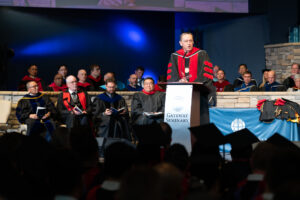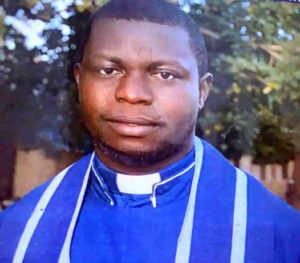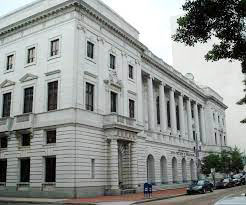
NASHVILLE, Tenn. (BP)–Bob Hope died July 27 at the age of 100, and millions of people worldwide have been remembering him as a legendary comedian, a Hollywood star, an avid supporter of the American military and simply a great man.
But Martha Bolton, who was a staff comedy writer for Hope for more than 15 years, said there was an element of faith in Hope’s life.
“He was a very religious man but privately religious,” Bolton told Baptist Press. “He had a definite respect [for spiritual things], and God held a special place in his heart.”
Bolton, who now lives just outside Nashville, Tenn., began writing comedy as a church secretary.
“I saw a lot of comedy in the church,” she said. “I used to perform a Friar’s Club-type roast on the pastor, deacon or any other church staff member who was celebrating a special occasion. I had to change churches a lot.”
Then she wanted to get into television writing, so she started sending out material and was hired to write for Phyllis Diller. Before long she was writing for a television show, and though the producer liked her work, the show was canceled. Someone with the show was connected with Bob Hope and recommended Bolton to him as a comedy writer.
The first time Hope called Bolton, it was about 11:30 at night, she recounted. She had been out for the evening, and her husband had gone to take the babysitter home. She answered the phone.
“There was a deacon in our church who did voices, so for the first part of the conversation I was saying, ‘OK, I know it’s you, Frank, and you’re not even that good.’ But it was Bob Hope of course.”
Bolton said the joke she wrote for Hope that stands out the most to her is one she wrote after a significant earthquake shook California. She said the assignment to write jokes about it came in “as we were still having the aftershocks.”
The joke: “I don’t mind earthquakes. I just figure they’re God’s way of letting me get a hole in one.”
Bolton said one thing she learned from Hope was how to write fast.
“He was the king of topical humor. Whatever was happening in the news or in politics he would be on top of it so we had to write really fast,” she said. “I remember one incident in particular. We were writing for a psychiatrist convention he was going to be performing at, so we wrote psychiatrist jokes. But when he got to the venue he discovered that it wasn’t a psychiatrist convention, it was a chiropractor convention, so we had to write all new material in about 15 or 20 minutes.”
In addition to writing for Hope and Diller, Bolton also has written comedy for Ann Jillian, Mark Lowry and others. She has a regular column called “The Cafeteria Lady” in Focus on the Family’s Brio magazine for teen girls. She has been nominated for an Emmy and a Dove Award, and she has written several books including “A Funny Thing Happened to Me on My Way Through the Bible” and “The Cafeteria Lady ‘On the Loose.'”
HOPE’S APPEAL CAUGHT ON QUICKLY
As many Americans are remembering, Hope grew up in Cleveland, Ohio. He added extra income to the family as a newspaper boy, soda seller and briefly as a boxer named Packy East. He found sanction in show business, beginning as a song-and-dance man, then adding comedy while touring the country in vaudeville. Next came a big break on Broadway in the 1933 musical “Roberta.” In 1934 he began a long career in radio. With his rapid delivery, topical gags and self-effacing humor, Hope quickly became a household name.
In 1938, Hope made the transition to movie stardom with his appearance in “The Big Broadcast of 1938,” in which, with his costar Shirley Ross, he sang what was to become his theme song, “Thanks for the Memory.” The following year he made “The Cat and the Canary,” in which he first demonstrated a comic side that would from then on be closely associated with his screen personality: that of the braggart who quickly turns into a lovable coward in the face of danger.
With his soon-to-be frequent costar, Bing Crosby, Hope began a new film genre — the road picture. These screen collaborations became the first “buddy” films. With the successful box office returns of “The Road to Singapore” in 1940, Paramount Studios quickly paired Hope and Crosby for several other adventures in colorful locales such as Morocco, Zanzibar, Bali and Rio. Of course, these “exotic” locations were actually simulated on the Paramount backlot. But that didn’t matter. It was the comical camaraderie between Crosby and Hope and their struggle to win over Dorothy Lamour in each of these pictures that made for fun viewing.
In film after film, Crosby would scheme to get rich quick, usually placing his hapless partner in harm’s way. Added to the humorous situations and the memorable songs Crosby would croon, the “boys” would ad lib in nearly every scene, sparking a natural liveliness seldom seen before. Asides to the audience were generally the funniest moments in these movies.
With nearly 60 films to his credit, Hope was proud of his association with the entertainment world. In the book, “The Road to Hollywood — My 40-Year Love Affair with the Movies,” which he coauthored with film historian Bob Thomas, Hope said, “Hollywood speaks a universal language, and the neighborhood movie house is in a sense a meeting place for all the people. They laugh at the same silliness, hiss the same villains. They look at a mirror that is held up to nature. When they walk out of the darkened theater and into the light, they often have a better view of the world and of themselves.”
Honored by the Motion Picture Academy with Oscars five times for his humanitarian activities and contribution to the entertainment industry, he frequently hosted the Academy Awards with both humor and class. Between 1941 and 1953 he ranked among Hollywood’s top 10 money-making stars. Possibly given more honors and awards than any other American, Hope’s list is topped with the Kennedy Center Honors and the Presidential Medal of Freedom.
As television began to enter the living room, Hope found an accepting audience and long-lasting success, remaining with NBC for 50 years. When he wasn’t performing, he found time to author several humorous books concerning his travels and career, including “Have Tux, Will Travel,” “Confessions of a Hooker: My Life-long Love Affair with Golf” and “Don’t Shoot, It’s Only Me.”
A TRUE PATRIOT
Vaudevillian, singer, dancer, author and Broadway, radio, television and movie star, Hope certainly found a secure place among Hollywood’s illustrious constellation. But it was his association with the USO and servicemen from every wartime confrontation since World War II that most endears the star to the hearts of his countrymen.
Since 1941, Hope has contributed to his country’s war efforts by providing entertainment for America’s fighting men. And make no mistake, it was not silk sheets that he went back to after performing for the boys. His trips to out-of-the-way and extremely dangerous military zones included frequent visits to frontline hospitals where he would talk to as many wounded men as time allowed.
He saw the horrors of war face to face. With each new locale, he experienced lives destroyed because of man’s inhumanity. His own life was in danger every time he went overseas. While he didn’t have to give that last full measure of devotion, he was willing to do so, not just during one evil conflict, but in every theater of war from World War II to the eve of Operation Desert Storm in the Persian Gulf.
Upon Hope’s death, President Bush said America lost a great citizen.
“We mourn the passing of Bob Hope. Bob Hope made us laugh, and he lifted our spirits,” Bush said July 28. “Bob Hope served our nation when he went to battlefields to entertain thousands of troops from different generations. We extend our prayers to his family. And we mourn the loss of a good man. May God bless his soul.”
Bush also officially proclaimed that on the day of Hope’s interment, the flag of the United States will be flown at half-staff at the White House and all public buildings and grounds, all military posts and naval stations, and all naval vessels of the federal government until sunset. Bush also directed that the flag be flown at half-staff for the same period at all U.S. embassies, consular offices and other facilities abroad.
“The world has lost a great man. He loved life, he loved America and he loved laugher,” Bolton said. “He’s going to be missed.”
–30–
(BP) photo posted in the BP Photo Library at http://www.bpnews.net. Photo title: THE HUMOR BEHIND HOPE.















